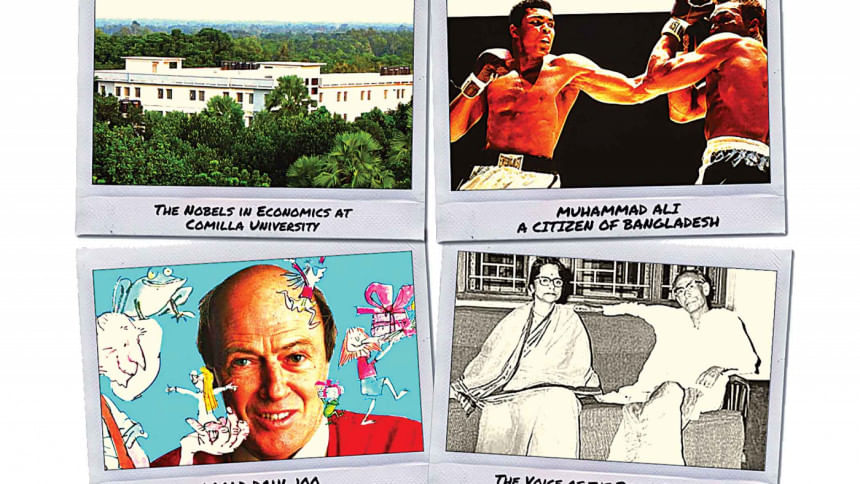Echoes at 100

I
Echoes first appeared on October 3, 2013. It started as a fortnightly column. Over the years, it had its ups and downs. It missed instalments. It even vanished for about 18 months when yours truly suffered a heart attack and before that a period of depression. And yet, seven and a half plus years later, Echoes rings a centenary bell.
II
My first encounter with The Daily Star was in 1992. The daily was a year old. Shamshad Mortuza, my batchmate at Jahangirnagar University, and university correspondent of The Daily Star, advised me to write a piece on the Beatles. I sent it to the popular supplement, Rising Stars. In mid-stream, it caught the eyes of the late Madan Shahu. The piece ended up being printed as the lead article of the Star Weekend magazine. I soon found myself contributing to Rising Stars. Its editor was Raffat Binte Rashid. From 1992 to 1996, I was part of a team, where we all had a wonderful time with Raffat at the helm.
Although I left for studies at the University of Cambridge in 1996, The Daily Star was always in my heart. It's hard to get over things you fall for in your youth.
During 2002-2004, I did translation, literary pieces and some book reviews in the Weekly Literature. Khademul Islam was the editor. Although Khadem Bhai was encouraging, I realised literature wasn't my cup of tea.
In November 2007, I called Shahnoor Wahid, the founding editor of the then youth magazine, Star Campus. Through Shahnoor Bhai, another sprint of infrequent contributions started. Elita Karim became its editor afterwards. She proposed I do a column. I gave some thought, and named it Post Campus, after Star Campus, obviously.

In June 2013, Star Campus released its final issue and with that, Post Campus became history. I thought it was the end of my association with The Daily Star. I was 43 by then. Elita got in touch, again. SHOUT, the new youth supplement, invited me to do a fortnightly column. I couldn't believe my luck. My favourite Pink Floyd piece "Echoes" sounded apt with SHOUT. And thus started a journey so far with three editors, Karim Al Waheed, Rumman R Kalam, and presently Kazi Akib Bin Asad.
III
The late Madan Shahu advised me well. First: always ask for the word limit. Second: edit well before submitting. Otherwise, the editor will edit. You could find that embarrassing. I never forgot Madan Da's words of wisdom.
It's possible to develop writing skill with water-tight limits over time if you don't write at the last moment. And you have time to edit before submission. One could argue, people think better when they're confronted by a deadline. The adrenaline runs fast and smooth. The problem with this line of thought: adrenaline can go wrong sometimes.
If you give time, you think better. Your thoughts are more organised. Complex sentences become simple. Readers pause between sentences. Then move to the next sentence that connects the flow of reasoning. You can predict the feeling in the readers' minds as you throw words and sentences. Each paragraph or section throws a particular thought. The whole piece then connects like a jigsaw puzzle, with a conclusion that can be open-ended so the thoughts of what you write "echo" for some time. If you write at the last moment as a rule, the adrenaline won't always run smoothly.
Finding a topic for Echoes is the first challenge. The next challenge is to ensure topics don't belong to a particular genre, and don't overlap over time. If that happens, you soon become a one-trick pony. This is why when I run out of ideas, Echoes misses instalments.
I was 43 years old when SHOUT invited me to start this column, in 2013. It's a privilege to be associated with young people, but it also puts moral responsibilities on my shoulders. The youth of today are special. Not only will they guide Bangladesh soon, they are extremely clever, creative, and highly competitive. Topics have to be relevant to the youth, but also have to have a set of universal aspects: to make the reader think, look back, and think again. For this, I have to remind myself each story has to be free of technical jargon.
I also try to remind myself, young people need to see the world through ethics, morality, and empathy. Then young people tend to see life as a journey where experience is appreciated more than success or failure.
IV
With its centenary instalment, today's Echoes also celebrates my almost thirty-year association with The Daily Star. In this time, I've seen its youth weekly start with Rising Stars and transform to today's SHOUT. Faces and places have changed over time, but one thing remained constant: The Daily Star has always encouraged free-thinking among the youth in Bangladesh.
Being able to have been a part of this atmosphere is something special. It's in this special place that Echoes looks forward to keep traveling with the young of tomorrow's Bangladesh.
Asrar Chowdhury teaches Economics in classrooms. Outside, he watches Test cricket, plays the flute and listens to music and radio podcasts. Email: [email protected] or [email protected]

 For all latest news, follow The Daily Star's Google News channel.
For all latest news, follow The Daily Star's Google News channel. 



Comments